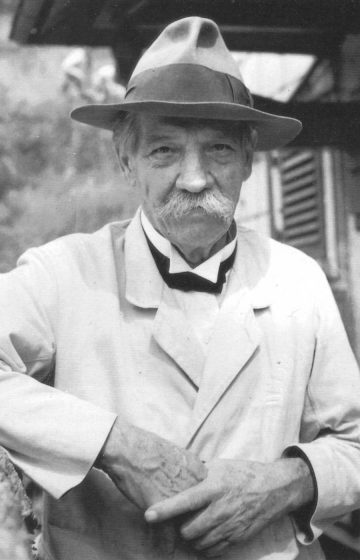The views expressed in our content reflect individual perspectives and do not represent the authoritative views of the Baha'i Faith.
Tell the truth: Do you love everyone? I wish I did, but I have to admit—some people in this world are really hard to love.
The Baha’i teachings ask us, though, to extend our sincere love toward every human being:
Just as God loves all and is kind to all, so must we really love and be kind to everybody. We must consider none bad, none worthy of detestation, no one as an enemy. We must love all; nay, we must consider everyone as related to us, for all are the servants of one God. All are under the instructions of one Educator. We must strive day and night that love and amity may increase, that this bond of unity may be strengthened, that joy and happiness may more and more prevail, that in unity and solidarity all mankind may gather beneath the shadow of God, that people may turn to God for their sustenance, finding in Him the life that is everlasting. – Abdu’l-Baha, The Promulgation of Universal Peace, p. 267.
You’re probably thinking “Wow! That’s not easy!” At least I know I am. Sure, I want to love everyone, but I fall short of that worthy goal on a daily basis. It’s easy to blame that on unlovable people—but instead, the spiritual seeker learns to first look within, and call forth a greater love for God:
When you love a member of your family or a compatriot, let it be with a ray of the Infinite Love! Let it be in God, and for God! Wherever you find the attributes of God love that person, whether he be of your family or of another. Shed the light of a boundless love on every human being whom you meet, whether of your country, your race, your political party, or of any other nation, colour or shade of political opinion. Heaven will support you while you work in this in-gathering of the scattered peoples of the world beneath the shadow of the almighty tent of unity. – Abdu’l-Baha, Paris Talks, p. 38.
For travelers on a spiritual path, though, this stage of the journey comes with true tests and trials, even when you do consider all people as part of the human family. How does a seeker on a spiritual path deal with the difficult issues, personalities and problems we all face? In the Third Valley of the four valleys, Baha’u’llah quoted Rumi in one potential answer to those questions:
The lover’s teacher is the Loved One’s beauty,
His face their lesson and their only book. – The Mathnavi
In Rumi’s passage “the Loved One” refers to God, and “the lesson” refers, in one sense, to the countenance and teachings of the Creator, which have always advised us all to love one another unconditionally and with all our hearts, regardless of our faults and foibles. The Baha’i teachings challenge us to reach that pinnacle of love by seeing the face of God in every human face:
Let us put aside all thoughts of self; let us close our eyes to all on earth, let us neither make known our sufferings nor complain of our wrongs. Rather let us become oblivious of our own selves, and drinking down the wine of heavenly grace, let us cry out our joy, and lose ourselves in the beauty of the All-Glorious. – Abdu’l-Baha, Selections from the Writings of Abdu’l-Baha, p. 236.
If a person has one thousand good qualities he must not look at them; nay rather, he must strive to find out his own defects and imperfections … On the other hand absolute perfection is unattainable by man. However much a man may advance yet he is imperfect, because there is always a point ahead of him. No sooner does he look up toward that point than he becomes dissatisfied with his own condition and aspires to attain to that. – Abdu’l-Baha, Star of the West, Volume 4, pp. 185-186.
Abdu’l-Baha advised the Baha’is:
To be silent concerning the faults of others, to pray for them, and to help them, through kindness, to correct their faults. To look always at the good and not at the bad. If a man has ten good qualities and one bad one, to look at the ten and forget the one; and if a man has ten bad qualities and one good one, to look at the one and forget the ten. Never to allow ourselves to speak one unkind word about another, even though that other be our enemy. – Abdu’l-Baha, quoted in Dr. J.E. Esslemont’s Baha’u’llah and the New Era, p. 82.

Albert Schweitzer
When we think about fully realized, morally mature, other-directed people like Albert Schweitzer, Florence Nightingale, Mother Teresa, Martin Luther King, Jr. or Mahatma Gandhi, all of whom transcended their own limitations to become servants of humanity as a whole, their examples of unconditional love can truly inspire us. Most people, though, never even entertain the idea that they can reach such a plane, regarding themselves as too selfish or too limited or too unloving.
But like all things, the transformation from one stage of spiritual maturation to the next takes place gradually—little by little, day by day. This third valley in Baha’u’llah’s Four Valleys—which asks each one of us to transcend the self and make connections with others—may mark the single most important stage of our moral maturation, because here the true seeker sees past the limited and into the unbounded reality of unity:
The main drift of mythology, if you want to put it into a sentence or two, is that the separateness that is apparent in the phenomenal world is secondary; beyond, and behind, and within, and supporting that world is an unseen but experienced unity and identity in us all. And the first level of unity that is recognized is that of the family. And the second level of unity, which is deeper, is of the tribe or the social unit. But beyond that is a common human identity. – Joseph Campbell, An Open Life, p. 52.
We all struggle to grow. Recognizing another person’s struggle to grow and develop expands your capacity for empathy and love. If you can acknowledge the good qualities of the people you meet, as spiritual seekers on their own path, and overlook the qualities they haven’t developed fully, you will find their essence—and your own.
















Comments
Sign in or create an account
Continue with Googleor